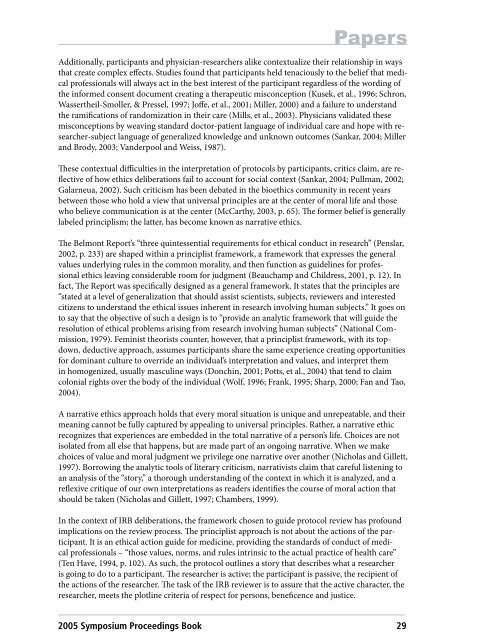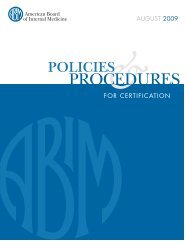The SRA Symposium - College of Medicine
The SRA Symposium - College of Medicine
The SRA Symposium - College of Medicine
Create successful ePaper yourself
Turn your PDF publications into a flip-book with our unique Google optimized e-Paper software.
Papers<br />
Additionally, participants and physician-researchers alike contextualize their relationship in ways<br />
that create complex effects. Studies found that participants held tenaciously to the belief that medical<br />
pr<strong>of</strong>essionals will always act in the best interest <strong>of</strong> the participant regardless <strong>of</strong> the wording <strong>of</strong><br />
the informed consent document creating a therapeutic misconception (Kusek, et al., 1996; Schron,<br />
Wassertheil-Smoller, & Pressel, 1997; J<strong>of</strong>fe, et al., 2001; Miller, 2000) and a failure to understand<br />
the ramifications <strong>of</strong> randomization in their care (Mills, et al., 2003). Physicians validated these<br />
misconceptions by weaving standard doctor-patient language <strong>of</strong> individual care and hope with researcher-subject<br />
language <strong>of</strong> generalized knowledge and unknown outcomes (Sankar, 2004; Miller<br />
and Brody, 2003; Vanderpool and Weiss, 1987).<br />
<strong>The</strong>se contextual difficulties in the interpretation <strong>of</strong> protocols by participants, critics claim, are reflective<br />
<strong>of</strong> how ethics deliberations fail to account for social context (Sankar, 2004; Pullman, 2002;<br />
Galarneua, 2002). Such criticism has been debated in the bioethics community in recent years<br />
between those who hold a view that universal principles are at the center <strong>of</strong> moral life and those<br />
who believe communication is at the center (McCarthy, 2003, p. 65). <strong>The</strong> former belief is generally<br />
labeled principlism; the latter, has become known as narrative ethics.<br />
<strong>The</strong> Belmont Report’s “three quintessential requirements for ethical conduct in research” (Penslar,<br />
2002, p. 233) are shaped within a principlist framework, a framework that expresses the general<br />
values underlying rules in the common morality, and then function as guidelines for pr<strong>of</strong>essional<br />
ethics leaving considerable room for judgment (Beauchamp and Childress, 2001, p. 12). In<br />
fact, <strong>The</strong> Report was specifically designed as a general framework. It states that the principles are<br />
“stated at a level <strong>of</strong> generalization that should assist scientists, subjects, reviewers and interested<br />
citizens to understand the ethical issues inherent in research involving human subjects.” It goes on<br />
to say that the objective <strong>of</strong> such a design is to “provide an analytic framework that will guide the<br />
resolution <strong>of</strong> ethical problems arising from research involving human subjects” (National Commission,<br />
1979). Feminist theorists counter, however, that a principlist framework, with its topdown,<br />
deductive approach, assumes participants share the same experience creating opportunities<br />
for dominant culture to override an individual’s interpretation and values, and interpret them<br />
in homogenized, usually masculine ways (Donchin, 2001; Potts, et al., 2004) that tend to claim<br />
colonial rights over the body <strong>of</strong> the individual (Wolf, 1996; Frank, 1995; Sharp, 2000; Fan and Tao,<br />
2004).<br />
A narrative ethics approach holds that every moral situation is unique and unrepeatable, and their<br />
meaning cannot be fully captured by appealing to universal principles. Rather, a narrative ethic<br />
recognizes that experiences are embedded in the total narrative <strong>of</strong> a person’s life. Choices are not<br />
isolated from all else that happens, but are made part <strong>of</strong> an ongoing narrative. When we make<br />
choices <strong>of</strong> value and moral judgment we privilege one narrative over another (Nicholas and Gillett,<br />
1997). Borrowing the analytic tools <strong>of</strong> literary criticism, narrativists claim that careful listening to<br />
an analysis <strong>of</strong> the “story,” a thorough understanding <strong>of</strong> the context in which it is analyzed, and a<br />
reflexive critique <strong>of</strong> our own interpretations as readers identifies the course <strong>of</strong> moral action that<br />
should be taken (Nicholas and Gillett, 1997; Chambers, 1999).<br />
In the context <strong>of</strong> IRB deliberations, the framework chosen to guide protocol review has pr<strong>of</strong>ound<br />
implications on the review process. <strong>The</strong> principlist approach is not about the actions <strong>of</strong> the participant.<br />
It is an ethical action guide for medicine, providing the standards <strong>of</strong> conduct <strong>of</strong> medical<br />
pr<strong>of</strong>essionals – “those values, norms, and rules intrinsic to the actual practice <strong>of</strong> health care”<br />
(Ten Have, 1994, p. 102). As such, the protocol outlines a story that describes what a researcher<br />
is going to do to a participant. <strong>The</strong> researcher is active; the participant is passive, the recipient <strong>of</strong><br />
the actions <strong>of</strong> the researcher. <strong>The</strong> task <strong>of</strong> the IRB reviewer is to assure that the active character, the<br />
researcher, meets the plotline criteria <strong>of</strong> respect for persons, beneficence and justice.<br />
2005 <strong>Symposium</strong> Proceedings Book 29

















